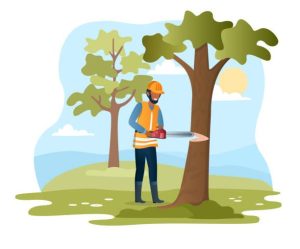Cutting Down Trees: Balancing Moral and Legal Perspectives for Environmental Conservation in Bangladesh

Sadikur Rahman: The act of cutting down trees has become a subject of ethical and legal debate all over the world the due to its implications for environmental sustainability. From a moral standpoint, trees hold intrinsic value and are essential for the well-being of the planet and all its inhabitants. They contribute to biodiversity, provide habitats for wildlife, and play a crucial role in climate regulation and oxygen production.
Cutting down trees without adequate justification or consideration for their ecological importance can be seen as morally wrong, as it undermines the integrity of ecosystems and threatens the balance of nature. However cutting down trees can be morally justified in the following cases-
- Sustainable forest management,
- Hazardous tree removal for public safety,
- Necessary land use and development,
- Indigenous cultural practices, and
- Tree health and forest restoration.
Even then, some unscrupulous people cut trees indiscriminately. Especially in the Sundarbans of Bangladesh, it is increasing significantly which is a legally punishable offence. In Bangladesh, the legal framework governing tree cutting is primarily regulated by the Forest Act, 1927, and the Bangladesh Environment Conservation Act, 1995. Besides these acts, there is also constitutional mandate regarding this matter.
Section 2 of the Forest Act defines various terms related to forests and forest produce, highlighting the importance of protecting and conserving forests for the benefit of the nation. Section 26 empowers the government to declare reserved forests and protected forests, indicating the state’s commitment to preserving forested areas. It also outlines provisions for the management, conservation, and utilization of forest resources, including regulations on felling trees and penalties for unauthorized cutting.
Section 2 of the Bangladesh Environment Conservation Act defines key terms related to environmental conservation, highlighting the importance of preserving natural resources for sustainable development. Section 16 emphasizes the need for obtaining environmental clearance before establishing new industries or undertaking projects that may have an adverse environmental impact. This provision ensures that tree cutting activities are carried out with proper consideration for their potential environmental consequences.

Cutting Down Tree
The Constitution of Bangladesh includes several provisions that recognize the importance of environmental conservation. Article 18A states that it is the fundamental duty of every citizen to protect and improve the natural environment, including forests and wildlife. This constitutional provision underscores the responsibility of individuals in preserving trees and forests for the benefit of present and future generations. Article 31 ensures the right to a clean environment, which includes the preservation of trees and forests. This constitutional provision recognizes the significance of maintaining a healthy and sustainable environment and emphasizes the protection of natural resources.
However the act of cutting down trees must be approached with careful consideration of both moral and legal perspectives in Bangladesh. By upholding moral principles, adhering to legal regulations, and promoting responsible tree management practices, Bangladesh can strive towards a harmonious balance between economic development and environmental conservation. It is crucial for individuals, communities, and the government to work together to ensure the protection of trees for a sustainable and thriving future.
The Writer is a Student, Department of Law, Bangabandhu Sheikh Mujibur Rahman Science and Technology University, Gopalganj.

